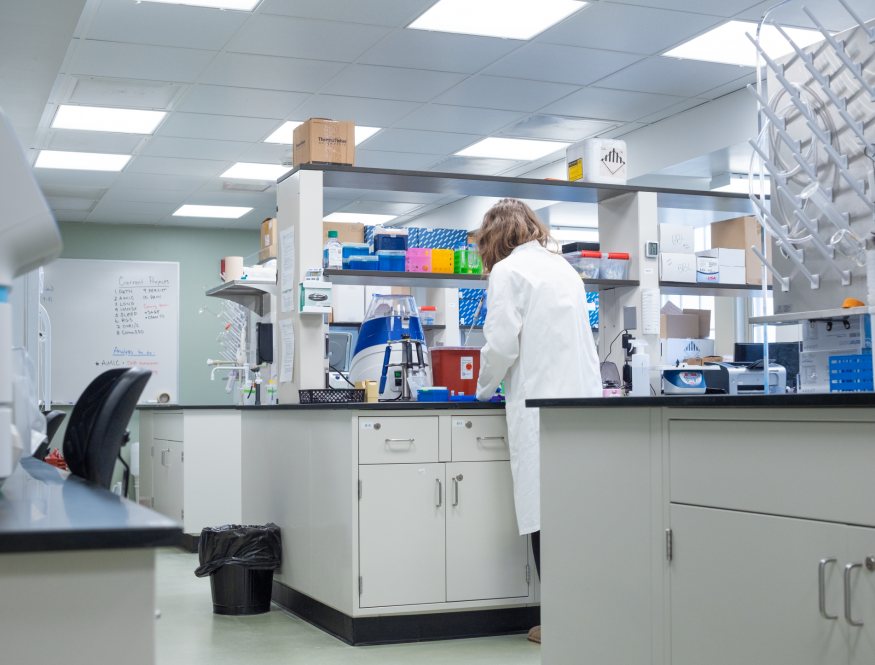A new collaboration between InCHIP and the School of Nursing Biobehavioral Research Lab will support research with potential implications for improving patient outcomes and reducing health care costs

(Danielle Faipler/UConn Photo)
UConn's Institute for Collaboration on Health, Intervention, and Policy (InCHIP) and the School of Nursing Biobehavioral Research Lab (BBL) are partnering to offer supplemental funding for UConn faculty to incorporate biomarkers into research that explores the critical connection between behavioral and biological processes and identify treatment interventions that improve patient outcomes and reduce health care costs.
Biomarkers, found in blood, bodily fluids, and tissues, help researchers identify biological processes, detect disease, monitor treatment efficacy, and guide treatment strategies.
The new supplemental funding is available to faculty applying for an InCHIP seed grant, which funds innovative pilot research that lays the foundation for a future external grant application.

"InCHIP connects researchers, clinicians, and methodologists with diverse scientific expertise to advance interdisciplinary public health research. We are pleased to collaborate with the Biobehavioral Research Lab to offer this new supplement, along with InCHIP's suite of seed grants. This new collaboration will allow investigators to conduct cutting-edge research to address today's complex health challenges," says Tricia Leahey, InCHIP director and professor of Allied Health Sciences in the College of Agriculture, Health and Natural Resources.
The Biobehavioral Research Lab supplement will provide investigators with up to $5,000 in lab credit to add biobehavioral assessments to their main InCHIP proposal. The supplemental funding can be used to cover the cost of collecting biological samples and assessing biomarkers that the BBL can process and analyze.

"The lab is excited to partner with InCHIP to offer this supplemental funding for seed grant applicants who want to incorporate biological elements in their proposals. We hope this enables researchers to branch out and increase the impact of their pilot studies," says Natalie Shook, director of the Biobehavioral Research Lab and a professor in the School of Nursing. "By making the connection between behavioral and biological processes, researchers can elucidate the biomedical implications of their research and potentially access more external funding opportunities."
Shook's research focuses on how psychosocial factors shape social attitudes, psychological and physical health, and health disparities among underrepresented groups.
Founded in 2019, the BBL supports student and faculty research at the intersection of biology and behavior. Located on the UConn Storrs campus, it features a behavioral lab in the Arjona Building and a wet lab in Beach Hall.
The behavioral lab in Arjona is equipped for data collection from human subjects, like interviews, surveys, physical assessments, quantitative sensory testing (i.e., pain sensitivity assessment), intervention administration, and sample collection, including phlebotomy, dried blood spot, and saliva.
The wet lab in Beach Hall is equipped to receive, process, analyze, and store animal and human biological samples. It offers services including blood component separation, DNA and RNA extraction and quantification, biomarker quantification (e.g., cytokines, hormones) via enzyme-linked immunosorbent assay (ELISA), and SNP genotyping.
The BBL's space, equipment, and services are available to faculty and student researchers outside of the School of Nursing for a fee.
Currently, the Lab is working with InCHIP Principal Investigator and Board of Trustees Distinguished Professor of Psychological Sciences Crystal Park and Rutgers University School of Nursing Dean and Professor and Biobehavioral Research Lab founder Angela Starkweather on a project evaluating the benefits of yoga in alleviating chronic low back pain and optimizing yoga interventions.






